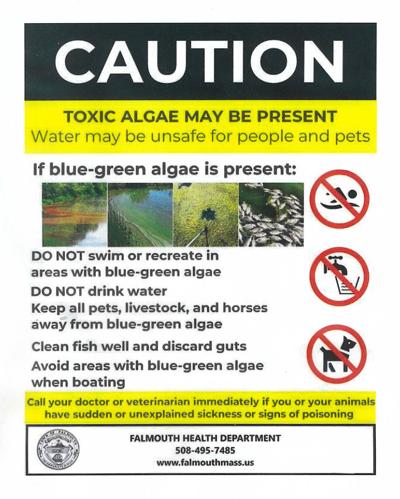Algae Blooms Prompt Advisory at Falmouth's Deep Pond

The Falmouth Board of Health warned residents of blue-green algae in Deep Pond after testing found high levels of blooms, which can be toxic to humans and animals. After two weeks, the pond was re-tested and was deemed safe as of Wednesday.
By CARRIE GENTILE Jul 2, 2020
Although the warm summer weather is just beginning, one of Falmouth’s freshwater ponds is already experiencing significant impacts from cyanobacteria blooms.
Two weeks ago, an ecologist for the Association to Preserve Cape Cod found a thick layer of blue-green algae on the surface of Deep Pond. The first monitoring occurred on June 17, when the algal scum was discovered and tested. The APCC contacted Falmouth’s health department, which responded by posting signs around public access and swimming areas warning that people should minimize exposure to the water and keep animals from drinking it. Swimming is not recommended.
“We found high levels of cyanobacteria concentrations, which can pose health risks,” APCC executive director Andrew R. Gottlieb said.
It can be dangerous for adults and is especially so for children and pets when ingested. In general, interacting with the pond in general carries risk for adverse health effects, he said.
Deep Pond is a 27-acre kettle hole in Hatchville situated between Boxberry Hill Road and Sam Turner Road, with public access off the latter. Homes circle the 1.1 miles of shoreline.
The use advisory was lifted Thursday, July 2, after a mandatory two-week closure per state law and two subsequent tests that revealed acceptable levels. Falmouth Health Agent Scott McGann said APCC notified him three weeks ago about high levels of blue-green algae in Mares Pond as well, and subsequent tests there have come back normal. This was the first year the APCC tested the ponds.
Cyanobacteria blooms are naturally occurring and are one of the oldest organisms on earth, Mr. Gottlieb said. They are a normal part of a healthy ecosystem, and their presence in Cape ponds in normal amounts is not problematic. However, trouble occurs when they become too concentrated due to excessive nutrients from septic systems and fertilizers, combined with warming water temperatures.
Exposure to cyanobacteria can cause serious health problems from skin rashes to death for people and animals who drink or come in contact with the water. Recent studies have also shown that the toxins can become airborne, drifting at least a mile away from the site of a toxic algae outbreak.
When people or animals ingest or are exposed to these toxins in certain high concentrations, they can experience anything from skin irritations or headaches to blisters around the mouth, even major liver damage.
“This is an increasingly common occurrence in freshwater ponds across the Cape,” Mr. Gottlieb said.
Many cyanobacteria blooms now occurring are being identified through a monitoring program initiated by the APCC, which is working with several nonprofits and towns across the Cape to monitor ponds. In Falmouth it is working with Falmouth Water Stewards and is monitoring Crooked, Mares, Deep, Jenkins and Cedar ponds.
